Despite all our efforts, the digital preservation community is still having a hard time “selling” its activities to funders and to society at large. As Bohdana Stoklasova of the Czech National Library said at the Goportis Digital Preservation Summit: our work is unglamorous and undervalued.
 Bohdana Stoklasova making sure that the funders of the Czech National Library’s digital projects get their credit’s worth – as specifically required by funding deals.
Bohdana Stoklasova making sure that the funders of the Czech National Library’s digital projects get their credit’s worth – as specifically required by funding deals.
Recently, the argument has been raised that we should stop describing our work in terms of ‘risk’ and ‘loss’ and ‘threats’, but rather speak in terms of ‘adding value’. During the panel discussion and coffee breaks at the Goportis Digital Preservation Summit, however, the consensus was that bad news sells better than good news. By suggesting that we organize a little data disaster I may have gone a little too far, but to my mind risk management is still the best approach to thinking about digital preservation.
 At the conference, Angela Dappert (previously British Library, now at the UK Digital Preservation Coalition) made the case for the risk management approach. In her view, risk management is central to all digital preservation activities. ‘Risk’, Angela began, ‘is uncertainty of outcome.’ It is something that might happen, and if it happens, it will become an issue’ (a problem). Risk management is about preventing risks from becoming issues. In that sense preservation is proactive whereas conservation is usually reactive (something has happened).
At the conference, Angela Dappert (previously British Library, now at the UK Digital Preservation Coalition) made the case for the risk management approach. In her view, risk management is central to all digital preservation activities. ‘Risk’, Angela began, ‘is uncertainty of outcome.’ It is something that might happen, and if it happens, it will become an issue’ (a problem). Risk management is about preventing risks from becoming issues. In that sense preservation is proactive whereas conservation is usually reactive (something has happened).
Below are some slides from Angela’s presentation (thanks for these, Angela); if you are interested in the subject be sure to check out the full presentation at http://www.digitalpreservationsummit.de/presentations.html.
It is important to note that not all risks need to be addressed immediately. It is a matter of balancing the risks against the available means to combat them. In some cases one may wish to accept a risk (e.g., when the collection is not essential for the organization, or when it concerns masters of digitized collections for which the analogue original is still available):
Angela gave an overview of available tools for risk management, including the most well-known framework, Drambora, and a new kid on the block in which Angela is involved, the Timbus project.
Just try and manage the risk of losing cultural heritage in a city like Hamburg …
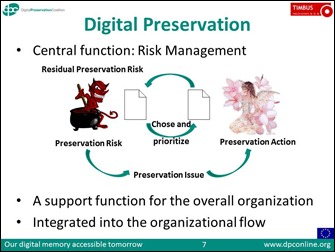
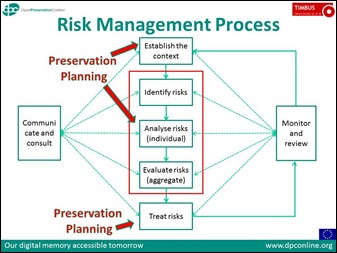

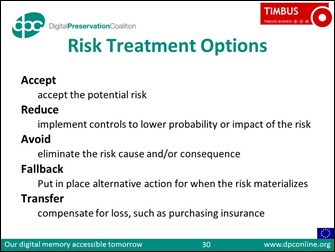
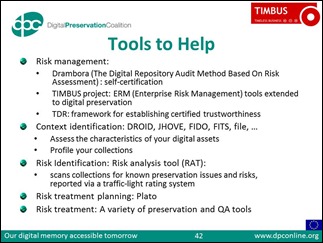
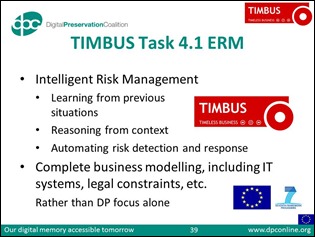

Geen opmerkingen:
Een reactie posten